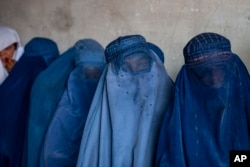Taliban leaders in Afghanistan have defended their Islamist rule amid intensified accusations of "gender-based" discrimination against women and girls at this week's U.N. General Assembly.
"The situation is not as it is portrayed and propagated abroad," Maulavi Abdul Kabir, the Taliban deputy prime minister for political affairs, asserted in an interview with an Afghan television channel aired Friday.
Kabir's comments came a day after nearly two dozen countries jointly supported Germany, Canada, the Netherlands and Australia in their initiative to hold the Taliban accountable for their alleged campaign to systematically exclude women from public life since the Taliban regained power in 2021.
The de facto Afghan rulers have imposed a strict interpretation of Islamic law, known as Sharia. The enforcement includes banning girls' secondary school education, prohibiting Afghan women from most workplaces, and requiring them not to speak aloud and to cover their faces and bodies in public.
Kabir, while speaking to the local Ariana News station on Friday, asserted that Western allegations of the Taliban driving women out of public spaces were misplaced, insisting that the human rights of all Afghans are protected under Islamic principles.
"Education for girls beyond the sixth grade and at universities is currently suspended," he responded when asked when secondary schools would reopen for girls. "The Islamic Emirate has not decided to keep them closed indefinitely, nor has the cabinet approved any such policy," Kabir reiterated, using the official title of their government in Kabul.
However, the Taliban deputy prime minister said that women are allowed to pursue education in religious seminaries, known as madrassas, across Afghanistan, including in the capital.
"There are female teachers. It is a single-sex Islamic educational system that requires hijab under the prevailing societal norms. It also permits women to pursue medical education," Kabir stated.
He said that the Taliban government employs 85,000 women in health, immigration, education, passport and other departments. "There are hospitals in Kabul being run by female directors," Kabir said.
Nations urge Taliban to address concerns
Countries such as Spain, Sweden, Belgium, Bulgaria, Chile, Croatia, Finland, Honduras, Ireland, Iceland, Latvia, Luxembourg, Malawi, Morocco, Moldova and Romania are supporting the four-nation push to start proceedings against the Taliban at the International Court of Justice in The Hague.
The United States in not a member of the ICJ.
In their joint statement issued in New York on Thursday, these countries urged the Taliban to respect international treaties on eliminating discrimination against women, to which Afghanistan is a party.
They hailed the initiative spearheaded by Germany, Australia, Canada and the Netherlands to push proceedings against the Taliban, urging the de facto Taliban authorities to address international concerns or face the legal challenge.
"This action is without prejudice to our firm position that we do not politically recognize the Taliban de facto authorities as the legitimate representation of the Afghan population," the statement stressed. "Afghanistan's failure to fulfill its human rights treaty obligations is a key obstacle to normalization of relations."
The Taliban government is not formally recognized by any country, nor is it allowed to represent Afghanistan at the United Nations, mainly over human rights concerns.
U.N. Secretary-General Antonio Guterres said on the sidelines of this week's General Assembly that the Taliban's treatment of women can be compared to "some of the most egregious systems of oppression in recent history."
"We will continue to amplify the voices of Afghan women and call for them to play a full role in the country's life, both inside its borders and on the global stage," he said.
Kabir criticized the U.N. for not granting the Afghanistan seat at the world body to the Taliban.
"We have met our obligations," he said. "The Islamic Emirate controls the entire geographical territory of the country. People are satisfied with us, and we are governing with the help of the people."





